There are many reasons why you might choose to use baby formula to feed your infant. Whatever the circumstances, I totally support those looking for a non-toxic, organic baby formula they can rely on.
If you can nurse your baby and you want to, great, but using formula doesn’t mean you can’t also make good choices over which formula you feed your baby.
Before you grab the first organic infant formula you can find though, it pays to do a little research to see if that formula really is organic and safe.
Formula gets confusing real fast, and I offer my recommendations for the best organic baby formula below to help make things a little bit easier.
The good news is that many companies have ditched corn syrup and sugars and cheap oils such as canola and soy and have replaced these with natural lactose and healthier oils like coconut oil. Baby formulas are so much healthier now than they were even a handful of years ago!
The bad news is that it’s not strictly possible to have an entirely organic baby formula made in the US. This is because the law requires companies to add synthetic nutrients to meet certain standards.
This is why many parents turn to genuinely organic formula made in Europe instead (more on this below).
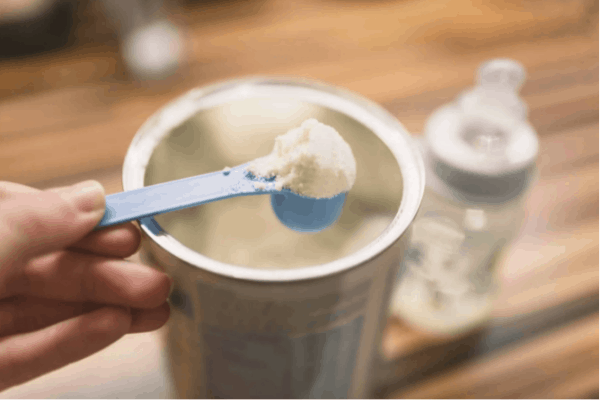
This post may contain affiliate links. Please see my full disclosure policy for details.
Quick Navigation
Baby Formula Stages
You should also know that baby formula marked PRE is not being marketed for babies born prematurely, i.e., premies. PRE formula is starch-free, meaning it can be used to feed more to hungry infants every three hours rather than having to wait between feedings or to feed less.
In Europe, baby formulas are also divided into Stages, with pre-stage for premature babies, Stage 1 for babies from birth to 6 months, Stages 2 and 3 for babies 6 months to a year, and Stage 4 for toddlers over a year old.
In the US, most formulas are one-size-fits-all, which is a bit silly considering that babies’ nutritional needs change a lot in that first year or so. Some US manufacturers have now started using stages to help make things a bit clearer.
Before we jump to the recommendations, here are a few things to avoid in baby formula.
What to Avoid in Baby Formula
Over the years, some formulas have been found to contain high levels of dangerous heavy metals such as arsenic, lead, and mercury. These can profoundly affect an infant’s development, causing lasting, irreversible damage, including to the brain.
Choosing a safe infant formula is largely about avoiding bad stuff like these heavy metals, as well as formula that may contain:
- Traces of pesticides, herbicides, fungicides, or other such chemicals
- Milk contaminated with growth hormones or antibiotics
- Hexane-extracted oils
- Genetically modified soy
- Palm oils
- Some forms of DHA (with caveats, see below)
- Synthetic nutrients
- Synthetic preservatives
- Processed, refined sugars
- Heavy metals
- BPA
Pesticides are pretty well understood as having no place in infant formula or any of our food, but the other items on this list may be less of an obvious risk to infant health. Here’s a quick rundown on why you might want to avoid these ingredients in infant formula.
Growth Hormones – No Whey!
Sorry, I couldn’t resist the pun.
If buying cow’s milk formula, check to see if the cows were given growth hormones or antibiotic treatments. You don’t need to worry about this if you’re buying organic formula as such things aren’t allowed to be given to cows labeled as organic.
Palm Oil
Why is palm oil a problem in baby formula? Well, aside from the environmental cost of palm oil, this oil isn’t an exact match for the palmitic acid naturally found in breastmilk and is digested quite differently. Palm oil may inhibit calcium absorption, for instance. Loulouka’s organic baby formula doesn’t contain palm oil.
Other fats can more closely mimic natural fats in breast milk compared to palm oil. And getting the right fats can promote better infant gut health and nutrient absorption. Many formulas use coconut oil to help achieve this balance.
Palm oil isn’t always bad though. Kabrita, for instance, uses a mixture of palm oil and vegetable oils processed using enzymes to create a more biosimilar fat blend for their goat milk formula.
Synthetic Preservatives
Baby formula often contains preservatives, some natural and some synthetic.
This is largely to help prevent the fats in the formula from spoiling. You’re most likely to find synthetic forms of vitamin C and beta-carotene as preservatives in organic baby formula. Although this sounds okay, these don’t actually add to the nutritional value of the formula and are mostly used when the formula contains DHA that is at risk of spoiling.
If you can, I’d say avoid formula with these synthetic preservatives, which are listed as ascorbyl palmitate and beta-carotene.
Synthetic Nutrients
Baby formula sold in the US is mandated to provide certain levels of nutrients. This means that regulators allow even organic baby formula (and non-organic formula!) to contain several synthetic forms of nutrients to meet those requirements. (In the European Union, these synthetic nutrients aren’t allowed in organic formulas.)
Isn’t more nutrition better? Not so fast. These synthetic nutrients may have been processed with a bevy of toxic chemicals, including hexane and toluene, which can cause neurological issues and other adverse health effects.
So, watch out for synthetic lutein, lycopene, taurine, and others, and be sure to ask the company if you don’t see information on their extraction processes.
Certain Sugars
Because human milk is naturally really sweet, formula manufacturers add various sweeteners to their products to appeal to babies. Really, though, babies don’t need refined, processed sugars from corn syrup, sucrose, brown rice syrup, and so on.
In fact, organic infant formula containing brown rice syrup was found to have six times the Environmental Protection Agency’s safe limit for arsenic in a study published back in 2012.
Again, in the European Union, certain sugars (such as sucrose) are banned in infant formula over concerns about overfeeding and obesity.
Lactose is the natural sugar most closely matched to the sugars in human milk, and this is usually present in infant formula courtesy of cows.
Lactose-free formulas tend to use maltodextrin as the main source of carbohydrates and sweetness. This isn’t terrible, but lactose does seem to be the better, if more expensive, option.
Aluminum
There are a lot of reasons why infant formula can end up with high levels of aluminum. Unfortunately, testing doesn’t always catch this as there are limits on aluminum levels in ingredients but not always on the overall product.
The use of additives, certain manufacturing processes, and even raw ingredients such as powdered milk treated with aluminum to prevent clumping can all add to aluminum content in formula.
To keep the risk of aluminum toxicity low, you might want to avoid formulas containing a lot of soy, as this plant concentrates aluminum.
It’s also best to check how a manufacturer creates the formula and whether this involves powdered milk or other ingredients treated with aluminum. Some brands engage in independent, third-party testing of every batch of formula to ensure very low levels of heavy metals and other potential contaminants.
Finally, if you aren’t already using filtered water to make up formula, it’s best to do so as this can help filter out other contaminants such as chlorine and fluoride in amounts that can prove unsafe when combined with levels already in infant formula.
Carrageenan
Carrageenan comes from seaweed and is found in quite a lot of food and beverages. It helps to stabilize liquid formula and is common in the US but is banned from all infant formula in the European Union. This is because some studies suggest that carrageenan may contribute to inflammation in the gut.
However, other research suggests that these studies are flawed and misleading, and that carrageenan shouldn’t be frowned upon in infant formula. In fact, carrageenan can be a useful stabilizer that ensures nutrients remain well dispersed in formula, meaning that if a baby doesn’t drink right to the bottom of their bottle they aren’t missing out on all the good stuff.
What to do about carrageenan? I generally avoid carrageenan whenever possible. That being said, if your choice is between a high-quality infant formula that contains carrageenan and a lesser quality one that doesn’t, I’d say go with the first.
If your baby does develop tummy upset, or is already using formula containing carrageenan and has gut issues, consider trying a different formula without the seaweed extract to see if things improve.
BPA
Baby formula sold in the US shouldn’t pose a risk of BPA contamination any longer, thanks to the FDA banning the use of this lining in cans of formula. If you’re importing formula from elsewhere, however, check that the cans are BPA-free as this chemical is a known endocrine disruptor.
And speaking of importing formula….
Imported Formula
Plenty of parents in the US choose to buy imported European baby formula to avoid some of the issues I’ve just mentioned, such as synthetic nutrients in organic formulas.
The trouble is that it can be hard to find a reputable seller, you won’t know if a product has been recalled, and products may have to be irradiated or used up very quickly due to longer transit times and closer expiry date.
There are also fake products in circulation, so be wary of those too.
How to Choose a Better Baby Formula
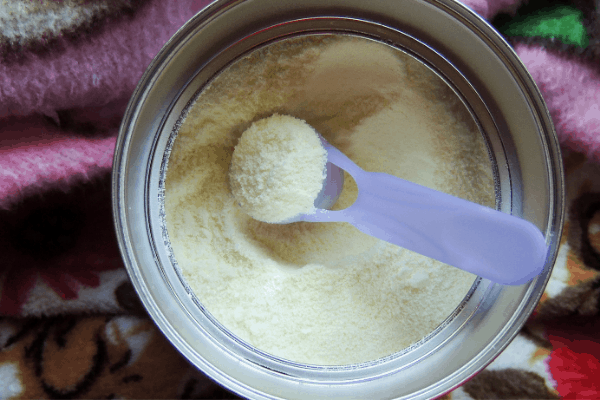
There are some good options for US-made baby formulas, but the reality is that Europe is much better at creating ‘cleaner’ infant formula. In addition, Europe has more organic options made without synthetic nutrients and preservatives.
Generally, if you get a non-organic infant formula, any soy in there will be genetically modified and likely contain traces of pesticides. Soy-based formula may also contain higher levels of aluminum because of how the plant grows, though the better brands will test to ensure levels are well below recommended safety limits.
Here are a few other things to consider when choosing a baby formula.
Goats Milk
Europe also excels at making goat’s milk formula, which is great as goat’s milk is far more similar to human milk than cow’s milk (and contains fewer growth hormones). Goat’s milk is also more alkaline and much richer in prebiotics to support healthy gut development.
Whether cow or goat, organic baby formula is always the best way to go. This is no guarantee that the formula is free from these troublesome ingredients, but it goes a long way towards offering reassurance of a safer product.
Prebiotics & Probiotics
Don’t get me wrong, probiotics and prebiotics (the things that feed beneficial bacteria) have a lot of substantiated health benefits. The trouble is that when these are present in infant formula they’re often just for show. All they tend to do is add to the cost of a formula and give a false sense of security to parents.
Human milk is a natural source of prebiotics and probiotics to help build and maintain a baby’s microbiome. If you’re feeding formula though, this doesn’t mean your baby has to miss out. You can always use a high-quality, probiotic supplement if this is something your doctor recommends.
DHA
DHA or docosahexanoic acid is an essential fatty acid naturally found in breast milk. Babies need a lot of DHA during fetal development and in those first few months and years to help form healthy brain, nerve, and eye tissue.
If DHA is so important, then, why do some people worry about it in baby formula? In short, because the DHA in many brands of baby formula has been extracted using hexane, a harmful chemical.
This is most common with DHA derived from microalgae or fungus. While such DHA may be just fine in formula for some babies, it’s good to know how it got there and if it’s actually adding health benefits or potentially causing harm.
Brands such as Nature’s One use DHA and ARA from eggs extracted without hexane, while some brands ditch the DHA and ARA altogether.
The answer is a resounding yes! Organic baby formula is better and contains fewer toxins than non-organic baby formula.
With readily available organic options, less harmful toxins, and increased testing by some organic companies, it’s an easy choice to make.
During these developmental times, it’s important to make sure your baby is drinking formula that is safe as possible.
Alright, to the formulas!
The Best Organic Baby Formula Recommendations
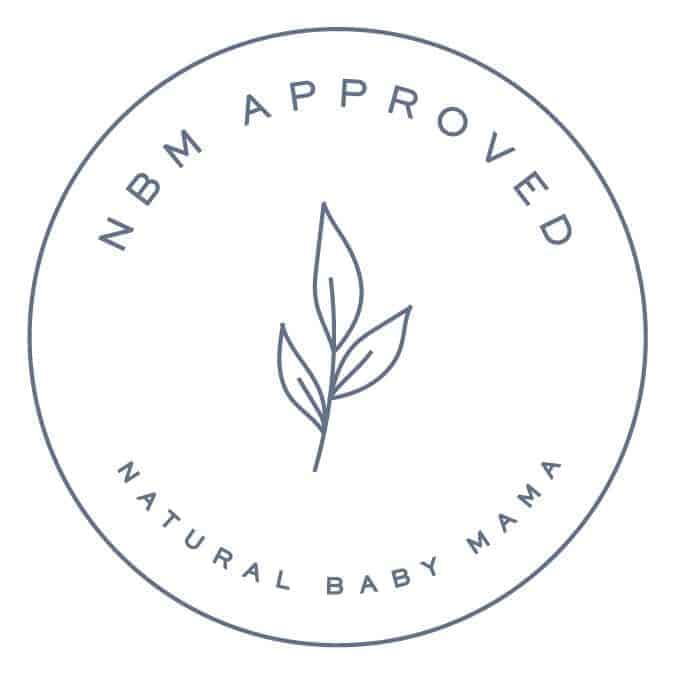
So let’s get to which are the best organic baby formulas! My top recommendations for organic baby formula include European formulas and some options more readily available in the US.
Three of the best European organic infant formulas are HiPP, Holle, and Lebenswert. These German formulas are produced without artificial flavors, GMOs, or other troublesome chemicals.
Holle is a certified biodynamic (beyond organic) infant formula, Lebenswert is certified organic, and HiPP is also certified organic but contains DHA, prebiotics, and probiotics, unlike the other two.
My top choice, though, is Loulouka Stage 1 Organic (Bio) Infant Milk Formula.
As for America, the best baby formulas I could find are Kabrita (for toddlers), Sammy’s Milk and Designed by Nature, all made in California from goat’s milk.
Loulouka Stage 1 Organic (Bio) Infant Milk Formula
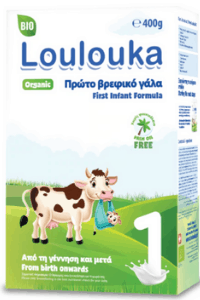
Made in Switzerland, Loulouka Stage 1 is a great choice for babies from 0-6 months. This organic baby formula contains all essential nutrients, with no GMOs, palm oil (they use coconut oil), or added sugar.
Based on milk from grass-fed Swiss cows, this formula provides around 70 feedings of 100 mL in each box, and each batch has around a 1-year expiration to help ensure freshness.
Loulouka is certified organic and is a good source of iron, vitamin A, vitamin C, and vitamin D. It does not contain soy and instead provides protein from milk and whey as well as DHA from fish oil.
The majority of the sugar is in the form of lactose, though note that Stage 2 contains maltodextrin as an additional sugar source.
Ingredients: Skimmed Milk°, Demineralised Wheypowder°, Vegetable Oil° (Sunflower Oil, Coconut Oil, Rapeseed Oil), Lactose°, Galactooligosaccharides° (GOS From Lactose), Minerals (Calcium Chloride, Sodium Chloride, Potassium Chloride, Magnesium Chloride, Calcium Phosphate, Calcium Citrate, Zinc Sulphate, Sodium Selenate, Manganese Sulphate, Potassium Iodate, Potassium Hydroxide, Copper Sulfate, Iron Sulphate), Emulsifier (Sunflower Lecithin°), Refined Fish Oil, Choline Bitartrate, Vitamins (C, E, A, D, B3, B5, Biotin, B12, K, Folic Acid, B1, B6, B2), L-Tyrosine, L-Tryptophan, Inositol, Antioxidant (Tocopherol-Rich Extract), L-Cysteine, L-Carnitine.
º Raw Material from Controlled Organic Production (º Eu Bio)
HiPP Hypoallergenic Organic Infant Formula PRE
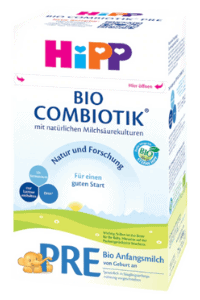
HiPP is an organic infant formula made in Germany that contains prebiotics, omega 3, and all essential vitamins and minerals. It contains no GMOs, antibiotic residues, hormones, artificial or synthetic ingredients, soy, wheat, gluten, or peanuts.
There are also no added sugars such as corn or rice syrup, fructose, or table sugar. The omega 3 comes from fish oil and vegetable sources rather than hexane extracted sources.
HiPP is a big company with a network of more than 6,000 farmers producing organic raw materials. It is still a family-owned business and is eco-friendly.
HiPP Hypoallergenic (HA) Infant Formula PRE is whey-based and starch-free, so you can feed your baby every 3 hours and ensure a good intake of essential nutrients.
It is a great choice for sensitive tummies, with the milk proteins hydrolyzed (split into small fragments) to reduce the likelihood of an allergic response.
HiPP Hypoallergenic PRE is suitable for use from birth onwards and can also be used later if switching from nursing or a different formula. Bear in mind, though, that if your baby is already sensitized to cow’s milk allergens, even this formula may cause a reaction.
HiPP is quick to mix – add boiled water and shake well. One box is the equivalent of 150 ounces of mixed formula.
Ingredients: Lactose, vegetable oils (palm oil³, rapeseed oil, sunflower oil), whey protein hydrolyzate, Galactooligosaccharides from lactose, calcium orthophosphates, Potassium chloride, LCP¹-containing oils (vegetable oil from M. alpina, fish oil), Emulsifier: citric acid esters of mono- and diglycerides of fatty acids, Potassium hydroxide, sodium hydroxide, L-tyrosine, L-phenylalanine, magnesium carbonate, Choline, calcium carbonate, vitamin C, L-tryptophan, inositol, iron lactate, Zinc sulfate, L-carnitine, natural lactic acid culture (Lactobacillus fermentum hereditum®)², pantothenic acid, vitamin A, niacin, copper sulfate, vitamin E, Vitamin B1, Vitamin B2, Vitamin B6, Manganese Sulfate, Potassium Iodate, Folic Acid, Vitamin K, sodium selenate, biotin, vitamin D, vitamin B12.
¹ LCP (omega-3 and -6) = long-chain, polyunsaturated fatty acids
² Lactobacillus fermentum CECT5716
³ palm oil from sustainable cultivation, certified by independent inspection bodies.
Holle
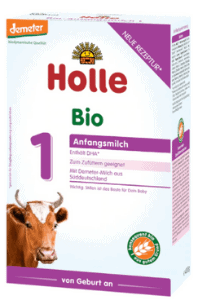
Holle has been around since the 1940s and makes certified organic and biodynamic infant formulas free from pesticides and chemical fertilizers, GMOs, added sugars, soy, corn, and synthetic preservatives or nutrients.
The milk proteins in Holle’s cow and goat milk formulas are processed to make them easier to digest (hydrolyzed). Because of how the cows and goats are grass-fed, their milk is naturally rich in vitamin E and beta-carotene and healthy omega fatty acids.
Holle Bio PRE formula relies on lactose as the only sweetener, meaning no maltodextrin.
This formula also has higher milk fat content than Holle’s other formulas and contains less vegetable oil.
Holle Organic Infant Goat Milk Formula does contain some maltodextrin, which is organic, along with lactose.
Ingredients: Whole Milk**, Whey Powder* (Partly Demineralized), Lactose*, Vegetable Oils* (Palm Oil*, Sunflower Oil*, Rapeseed Oil*), Skimmed Milk Powder**, Fish Oil, Skimmed Milk Powder*, Calcium Carbonate, Choline Bitartrate, Potassium Chloride, Sodium Chloride, L-Tyrosine, Vitamin C, L-Tryptophan, Ferrous Lactate, Vitamin E, Zinc Sulfate, Vitamin A, Vitamin D, Niacin, Pantothenic Acid, Copper Sulfate, Vitamin K, Folic Acid, Vitamin B1, Vitamin B12, Vitamin B6, Manganese Sulfate, Potassium Iodate, Sodium Selenate, Biotin
* From Organic Farming
** From Biodynamic Farming (Demeter Quality)
Lebenswert Organic Infant Formula Stage 1
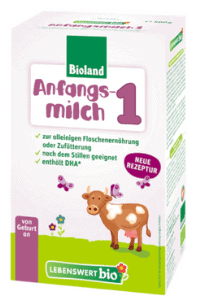
Lebenswert uses ingredients exclusively from Bioland Farming, the largest organic food association in Germany. Their Organic Infant Formula Stage 1 is based on organic milk from grass-fed cows and is non-GMO, gluten-free, and has no added sugar.
It does contain palm oil and canola (rapeseed) oil, however, and DHA from fish oil.
This formula features all essential vitamins and minerals and is suitable for use from birth onwards. It mixes easily with boiled water, and one box provides approximately 130 ounces of mixed formula. Lebenswert formulas above Stage 1 contain maltodextrin, so stick to Stage 1 if you’re trying to avoid this sweetener.
Again, because Lebenswert is not FDA-approved and is imported, it can be a challenge to find in the US.
Ingredients: Skimmed Milk*1, Whey Product* (Partly Demineralised Whey Powder)*, Vegetable Oils* (Palm Oil*3, Rapeseed Oil*, Sunflower Oil*), Lactose*, Calcium Carbonate, L-Tyrosine, Potassium Chloride, Fish Oil2, Magnesium Chloride, Calcium Chloride, Calcium Hydroxide, Choline, Sodium Chloride, L-Tryptophane, Inosit, Ferrous Lactate, Vitamin C, Zinc Sulfate, Vitamin E, Niacin, Pantothenic Acid, Copper Sulfate, Vitamin A, Vitamin B1, Manganese Sulfate, Vitamin B6, Potassium Iodate, Folic Acid, Sodium Selenate, Vitamin K, Vitamin D, Biotin.
* From Organic Farming
1 100g Infant Formula made from 153ml skimmed milk
2 Contains DHA (required by law)
3 From Sustainable Cultivation
Nature’s One Baby’s Only Organic Gentle Formula

Nature’s One Baby’s Only Organic Gentle DHA/ARA toddler formula is a good choice for organic formula and is widely available in the US, including at Whole Foods.
It is free from palm oil, corn syrup, and other sweeteners other than 100% organic lactose and is also free from carrageenan.
The Gentle formula includes hexane-free DHA and ARA extracted from eggs, while the regular organic cow’s milk formula is available with or without DHA and ARA.
Baby’s Only uses brown rice syrup as a sweetener in some of their formulas, including their regular (non-Gentle) dairy formula. This got flagged a few years ago as the product was one of many baby foods and formulas found to contain a high level of arsenic.
In response, Baby’s Only Organic® formulas began using a patent-pending filtration process approved for use by the USDA National Organic Program for its organic brown rice syrup and rice ingredients. This process removes arsenic and other heavy metals that may have been introduced through soil or environmental contamination.
This filtration reduces heavy metals from Nature’s One® formulas to undetectable levels or below U.S. drinking water standards. The formulas are now certified by an independent laboratory.
All in all, if you want a US-made infant formula, I’d suggest using their Gentle formula. Technically, this is for babies 12 months and older, so check with your pediatrician before using.
Nature’s One Baby’s Only also offers a dairy-free formula based on pea protein, which is about as close to a vegan-friendly infant formula as I’ve found in the US. (It isn’t strictly vegan as it contains vitamin D3, likely from lanolin from sheep.)
Bobbie Organic Baby Formula
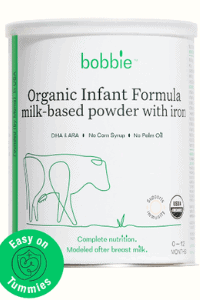
Bobbie Organic Baby Formula is available in the US and is very similar to European formulas as it features organic ingredients mainly from pasture-raised cows.
These cows are part of the Organic Valley cooperative of small family farms across the US, where the cows spend an average of 42% more time on pasture than USDA organic requirements.
This formula is also rare in the US in that there’s no corn syrup, maltodextrin, or other sweeteners in here aside from organic lactose. The formula does not contain added prebiotics or probiotics and uses solvent-free fats.
It is also the only US formula to meet EU standards for DHA at 20mg/100kcal. This DHA is derived from algae using a water-based, non-hexane process.
Bobbie formula is also free from palm oil, GMOs, pesticides, and antibiotic residues.
Bobbie Organic Baby Formula is also gluten-free and Kosher and every lot of formula can be traced using the 7 character alphanumeric code printed on the bottom of each can. This shows you when it was packaged, its expiration date, and quality test results from more than 2000 tests carried out by Bobbie.
Ingredients: Organic Lactose, Organic Nonfat Milk, Organic High Oleic (Safflower Or Sunflower) Oil, Organic Soybean Oil, Organic Whey Protein Concentrate, Organic Coconut Oil, Less Than 1%: Organic Soy Lecithin, Schizochytrium Sp. Oil, Mortierella Alpina Oil, Calcium Phosphate, Potassium Citrate, Sodium Chloride, Calcium Carbonate, Potassium Hydroxide, Potassium Phosphate, Magnesium Chloride, Potassium Bicarbonate, Ferrous Sulfate, Potassium Chloride, Zinc Sulfate, Cupric Sulfate, Manganese Sulfate, Potassium Iodide, Sodium Selenite, Choline Bitartrate, Ascorbic Acid (Vitamin C), Ascorbyl Palmitate, Inositol, Mixed Tocopherol Concentrate, Dl-Alpha Tocopheryl Acetate (Vitamin E), Niacinamide (Vitamin B3), Calcium Pantothenate, Vitamin A Palmitate, Riboflavin (Vitamin B2), Thiamine Hydrochloride (Vitamin B1), Pyridoxine Hydrochloride (Vitamin B6), Folic Acid, Phytonadione (Vitamin K), Biotin, Cholecalciferol (Vitamin D3), Cyanocobalamin (Vitamin B12). Contains Milk And Soy.
SHOP BOBBIE ORGANIC BABY FORMULA
Happy Baby Organic Infant Formula

Happy Baby Organic Infant Formula Stage 1 is another decent option for infant formula made in the US. This one is also made with milk and sweetened only with lactose.
It includes two types of prebiotics as well as soy oil and DHA and ARA derived from algae (though these are ‘thoughtfully extracted’ using a water-based method rather than hexane). It is free from synthetic taurine and added L-methionine and L-carnitine, as well as carrageenan, gluten, and maltodextrin, and is certified Kosher.
The company also offers a Sensitive Organic Infant Formula that contains 75% less lactose than their standard organic formula.
Ingredients (for standard organic formula): Organic Lactose, Organic Nonfat Milk, Organic Palm Olein or Palm Oil, Organic Soy Oil, Organic Coconut Oil, Organic High Oleic (Safflower or Sunflower) Oil, Organic Galactooligosaccharides (Gos [a Type of Prebiotic]), Organic Whey Protein Concentrate, Less than 1%: Fructooligosaccharide (Fos [a Type of Probiotic]), Choline Bitartrate, Potassium Chloride, Organic Soy Lecithin, Calcium Hydroxide, Mortirella Apina Oil (a Source of Arachidonic Acid (ARA), Calcium Phosphate, Sodium Citrate, Ascorbic Acid, Magnesium Chloride, DHA Algal Oil (Schizochytrium [a Source of Docosahexaenoic Acid {DHA}]), Potassium Bicarbonate, Inositol, Ascorbyl Palmitate, Ferrous Sulfate, Zinc Sulfate, Mixed Tocopherol Concentrate, Vitamin E (DL-Alpha Tocopheryl Acetate), Niacinamide, Calcium Pantothenate, Cupric Sulfate, Vitamin A Palmitate, Riboflavin, Thiamine Hydrochloride, Pyridoxine Hydrochloride, Manganese Sulfate, Beta-Carotene, Potassium Iodide, Folic Acid, Vitamin K (Phytonadione), Biotin, Sodium Selenite, Vitamin D (Cholecalciferol), Cyanocobalamin.
Ingredients (for Sensitive): Organic Nonfat Milk, Organic Maltodextrin, Organic Glucose Syrup Solids, Organic Palm Olein Or Palm Oil, Organic Soy Oil, Organic Coconut Oil, Organic High Oleic (Safflower Or Sunflower) Oil, Organic Galactooligosaccharides (Gos§), Organic Whey Protein Concentrate, Less Than 1%: Fructooligosaccharide (Fos§), Choline Bitartrate, Potassium Chloride, Organic Soy Lecithin, Calcium Hydroxide, Mortierella Alpina Oil†, Calcium Phosphate, Sodium Citrate, Ascorbic Acid, Magnesium Chloride, DHA Algal Oil (Schizochytrium)‡, Potassium Bicarbonate, Inositol, Ascorbyl Palmitate, Ferrous Sulfate, Zinc Sulfate, Mixed Tocopherol Concentrate, Vitamin E (Dl-alpha Tocopheryl Acetate), Niacinamide, Calcium Pantothenate, Cupric Sulfate, Vitamin A Palmitate, Riboflavin, Thiamine Hydrochloride, Pyridoxine Hydrochloride, Manganese Sulfate, Beta-carotene, Potassium Iodide, Folic Acid, Vitamin K (Phytonadione), Biotin, Sodium Selenite, Vitamin D (Cholecalciferol), Cyanocobalamin. Contains Milk And Soy Ingredients. §A Type Of Prebiotic †A Source Of Arachidonic Acid (Ara) ‡A Source Of Docosahexaenoic Acid (Dha)
SHOP HAPPY BABY ORGANIC FORMULA or at TARGET
Kabrita Gold Stage 1 Infant Goat Milk Formula
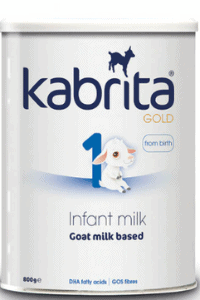
Kabrita Gold Stage 1 Infant Goat Milk Formula is made in the UK and is a great choice for babies from birth to 6 months. It is non-GMO, pesticide-free, and contains no hormones or antibiotic residues.
It is made with goat’s milk sourced from the Netherlands and Missouri.
Kabrita is one of the few brands using a specialty type of palm oil and vegetable oils processed to mimic the fats in breast milk. There is currently no coconut oil in this formula, making it a good bet for kids with coconut allergies.
This formula is enriched with prebiotics and DHA and ARA from fish, as well as all required minerals and vitamins.
The infant formula is not FDA-approved for sale in the US, though the company says they’re working on it.
Kabrita US does sell their toddler formulas in the US, intended for babies over the age of 12 months. These have an equal amount of whey to casein and use lactose as the main sweetener.
Kabrita Goat Milk Toddler Formula is also certified glyphosate-residue free.
Ingredients: Lactose (Milk), Vegetable Oils (High Sn-2 Palmitic Acid Oil, Soybean Oil, High Oleic Sunflower Oil, Palm Kernel Oil, Sunflower Oil), Skimmed Goat Milk Powder, Goat Whey Protein Concentrate (Milk), Glucose Syrup Solids, Gos (Milk), Minerals (Tri Calcium Phosphate, Calcium Carbonate, Magnesium Carbonate, Ferrous Sulphate, Zinc Sulphate, Manganese Sulphate, Copper Sulphate, Potassium Iodide, Sodium Selenate), Marine Oil Containing DHA (Fish), Aa-Oil, Choline Bitartrate, Vitamins (Ascorbic Acid, Dl-Alpha Tocopheryl Acetate, Nicotinamide, D-Calcium Pantothenate, Thiamine Hydrochloride, Riboflavin, Retinyl Acetate, Pyridoxine Hydrochloride, Folic Acid, Phytomenadione, Biotin, Cholecalciferol, Cobalamine), Choline Chloride, Taurine, Meso-Inositol, L-Carnitine. Allergen Information: Contains milk, fish ingredients may vary between countries and regions in order to comply to local legislation.
SHOP KABRITA or on AMAZON
Final Thoughts
Figuring out baby formula is one of the first major challenges for parents and caregivers. It can be very confusing and very time consuming to look into and understand what’s available where you are.
While some formulas are definitely better than others in terms of being ‘clean’, it’s important to remember that fed is best, however that looks for you and your baby.
I hope this article has helped clarify some of the things to avoid in baby formula and what to look for in a good organic infant formula.
It can be overwhelming to find truly safe products, I have created my Amazon Storefront for vetted non-toxic baby and home products (including formula).
Other Posts Related to Organic Formula
- Non-Toxic Bottles
- Non-Toxic Car Seats
- Organic Baby Clothes
- Wood Play Gym
- Non-Toxic Toys
- Goat Milk Formula
- Organic New Born Baby Clothes
- Organic Kid’s Clothing Brands
- Low EMF Baby Monitors
- How to build a Non Toxic Nursery
Pin it for later!
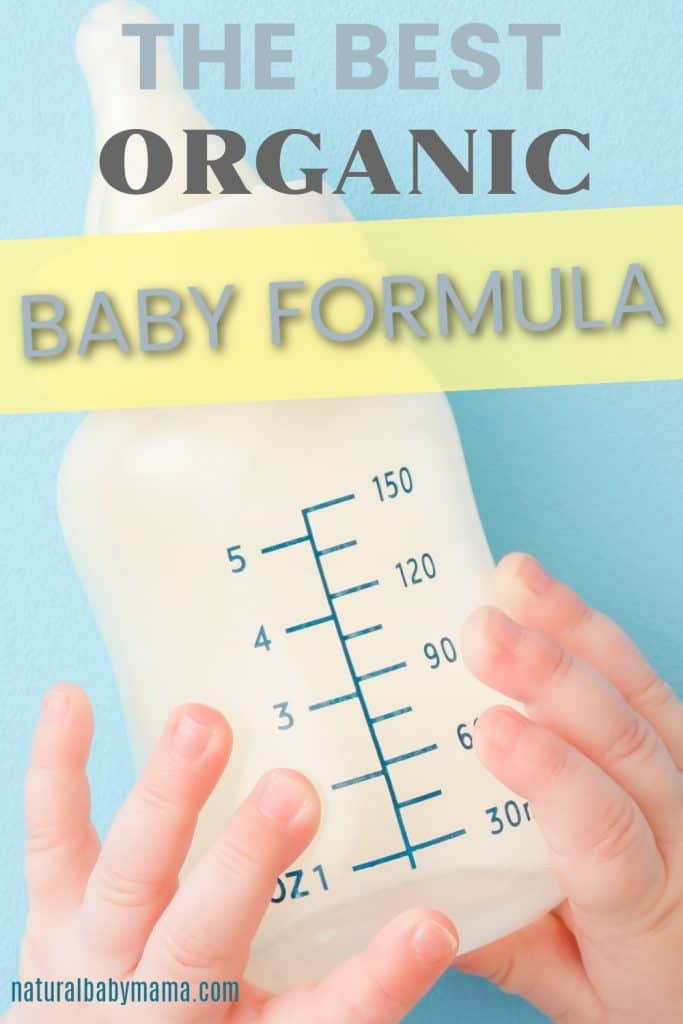
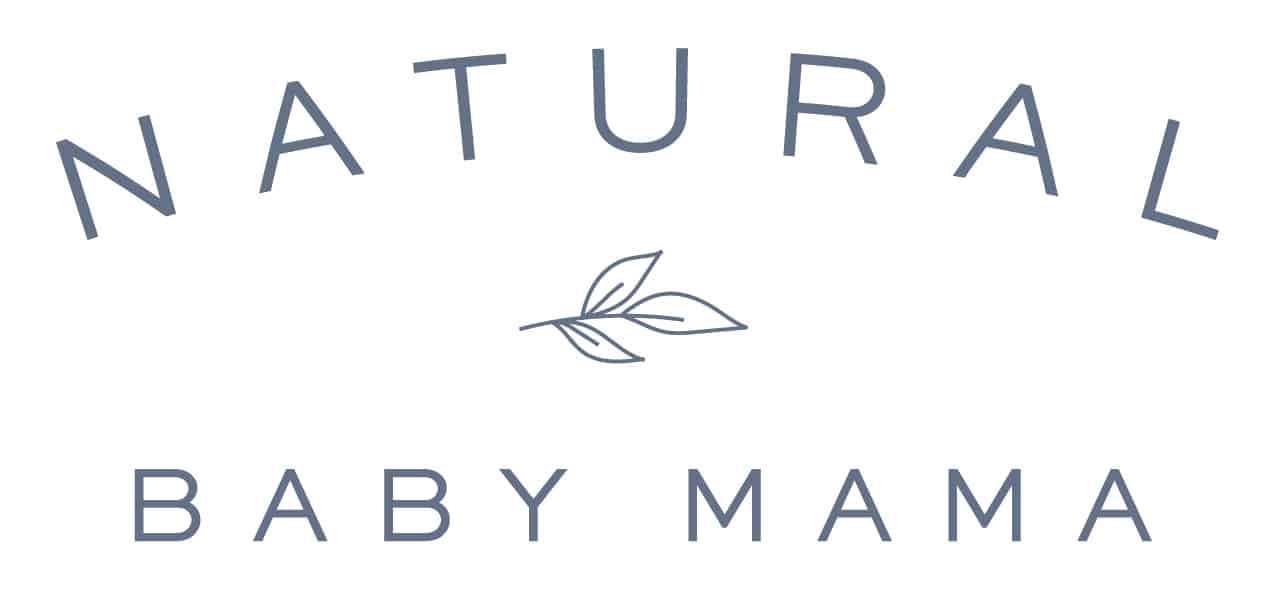


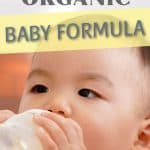
What about Bobbie?
Hi, I have Bobbie listed in the post. Did you have a specific question about them?
What about stage 2 and 3 formulas? Which are best for those?
Hi, I would look to the European brands listed in this post for those as well.